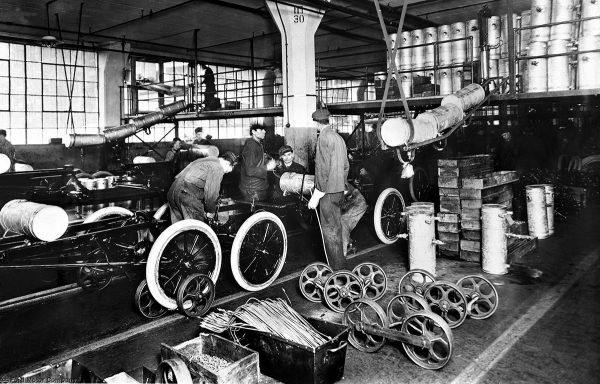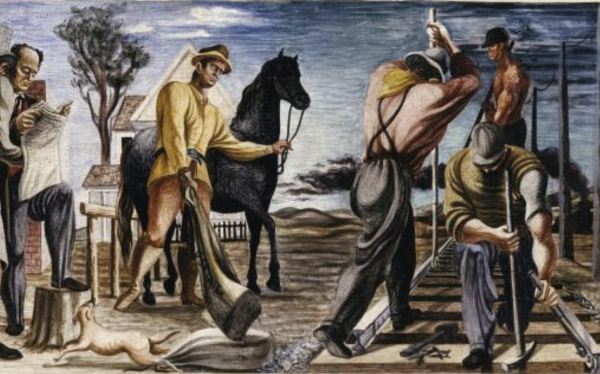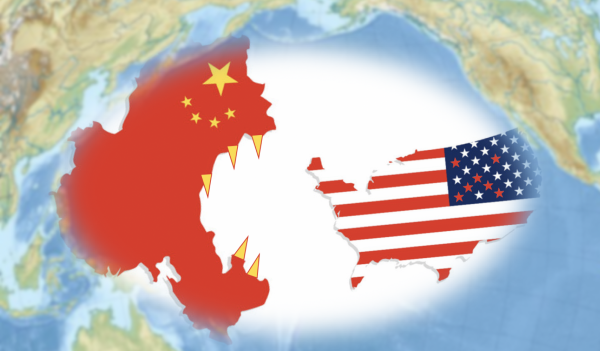Building state capacity isn’t an ism.
The “Central Planning” Strawman

We ought to rewrite policy, not history.
Senator Marco Rubio’s latest call for an American industrial policy to counter China suggests economic libertarianism, and the revisionist history it inspired, is finally losing its grip over the conservative imagination. Let’s hope so.
As Rubio noted in his December speech at the National Defense University, “from World War II to the Space Race and beyond, a capitalist America has always relied on public-private collaboration to further our national security.” One would think this is a completely uncontroversial statement, and yet stupefied commentators of the libertarian persuasion responded on cue, complete with the usual hyperbolic clichés about “central planning” and “picking winners and losers.”
At National Review, for example, writer Kevin Williamson (who recently described Rubio’s concept of “common good capitalism” as a slippery slope to fascism) reacted to the speech by telling Rubio to go read Leonard Read’s essay, “I, Pencil.” And yet, in the very same piece, Williamson admits that Detroit became the Motor City in large part due to public investments that magnified the region’s cluster of engineering talent:
The complicated truth is that Henry Ford (and every other entrepreneur) drafted behind both public-sector and private-sector investments that preceded him and his own innovations. The marine-engine business helped lay the foundations for the subsequent success of Detroit’s automotive industry, but so did roads and schools and the like. There’s a word for that: civilization.
Industrial policy is two words, but close enough (hat-tip to Oren Cass).
Of course, Williamson is correct that no one anticipated that federal investments in one industry (marine engines) would spur the development of another (automotives). But that plainly gives the lie to his caricature of industrial policy as “super-intelligent philosopher-kings in bureaucracies.”
Instead, effective industrial policy is really about solving obvious coordination and information failures, bootstrapping public investments in technologies that aren’t yet commercially viable, and building up a skilled workforce. Industrial policy thus works with the market, and at its best puts the market’s powers of creative destruction and knowledge aggregation on steroids.
The notion that economic systems can either be “free market” or under some kind of Soviet Gosplan is a false dichotomy that must be overcome. The libertarian apparatchik Veronique de Rugy exemplified this fallacy in her screed against Rubio in the New York Times, framing the debate as an either-or choice between Chinese “command-and-control” or American-style “permissionless innovation.” The superiority of the latter approach, de Rugy argues, was illustrated by the success of the Clinton administration’s 1997 “Framework for Global Electronic Commerce.”
The irony is that Clinton’s Framework represented a comprehensive national economic strategy, deliberately designed to encourage the dominance of American tech companies and the commercialization of the early internet—technology that the U.S. Department of Defense developed in the first place. De Rugy accuses Rubio of China envy, even though state-backed innovation that is transferred to the private sector to be aggressively commercialized is a model China learned from us, not the other way around.
To date, the type of legislation Rubio has put forward simply proposes to do something similar for other strategic and emerging industries. His draft reauthorization of the Small Business Administration, for instance, would reorient the agency’s loan and venture capital programs to support the commercialization of advanced manufacturers and federally-backed research and development. The specific design of the reform was inspired by the Israeli government’s successful effort to grow a high-tech export sector.
To call this kind of basic development policy an embrace of “command-and-control” is worse than misleading—it’s a complete strawman.
Unfortunately, American conservatives are far too easily beguiled by this sort of libertarian demagoguery. The reason for this is worth unpacking.
Hayek out of Hand
Following the collapse of Soviet Union, the core argument against central planning put forward by Austrian School economists Ludwig Von Mises and F.A. Hayek—the “knowledge problem”—seemed vindicated. Socialism, they had argued nearly six decades prior, was doomed to fail because of the intrinsic epistemic limits on central planning. An advanced economy requires decentralized coordination across a web of producers and consumers whose local knowledge and subjective preferences cannot be aggregated in principle. Only the price system, in the context of an undistorted market with complete property rights, can do that—and thus the American free-enterprise system emerged from the Cold War triumphant.
This narrative had an enormous influence on the conservative movement, helping to consolidate its embrace of economic libertarianism in the 1980s and ‘90s. At the same time, the argument Mises and Hayek developed to attack socialism—a wholly state-led economy—was stretched far beyond its original application into a kind of epistemological nihilism, potentially weaponized against any government intervention in the market: “Public investment in next generation manufacturing? That’s central planning. Do you even Hayek, bro?”
In turn, myriad examples of successful industrial policy, both in the U.S. and around the world, forced a generation of conservatives to “retcon” American history—that is, to make it retroactively consistent with the myth of America as a laissez-faire success story. From the infant industry protections and public works promoted by Henry Clay’s “American System,” to Reagan’s support for the semiconductor industry and the Department of Energy’s role in sparking the fracking revolution—surely America is the richest country on earth in spite of these forays into industrial policy, right?
Likewise, foreign countries that used aggressive industrial policies to get rich, including Japan, Korea, and Taiwan, would no doubt be even richer if they hadn’t. In fact, China’s economy is due to collapse like the Soviets’, since state-led development is not just less efficient but impossible a priori. Any day now…
The greatest irony of all is the extent to which this libertarian retconning is itself, in a sense, the product of central planning. Far from a spontaneous order, the libertarian influence on the conservative movement has largely emanated from the dense cluster of free market nonprofits in Northern Virginia.
A kind of industrial park for anti-government ideology, the Arlington corridor alone encompasses dozens of libertarian think tanks, litigation shops, recruitment and training organizations, marketing agencies, and more—all made possible with the financial backing and strategic coordination of a handful of wealthy donors and foundations. Call it building “anti-state capacity.” The successful infiltration of the conservative movement by hardcore libertarians even helps to demonstrate a number of industrial policy best practices, including but not limited to:
I note this not to knock libertarianism. On the contrary, I have spent the last five years embedded in the libertarian industrial park and can count myself as one of its exports. But I’ve also learned from Charles Koch’s own brilliant proof-by-example that a little bit of strategic planning and patient investment can go a long way. And so I recognize when invoking an impenetrable “knowledge problem” is really an excuse for willful ignorance.
The American Mind presents a range of perspectives. Views are writers’ own and do not necessarily represent those of The Claremont Institute.
The American Mind is a publication of the Claremont Institute, a non-profit 501(c)(3) organization, dedicated to restoring the principles of the American Founding to their rightful, preeminent authority in our national life. Interested in supporting our work? Gifts to the Claremont Institute are tax-deductible.
Don’t remake America: reinvent it.
Time is pressing to turn our tech Titanic around.
America thrives best free from market worship.
Actual policymakers have to do that.
The fix demands more than blame for Beijing.






